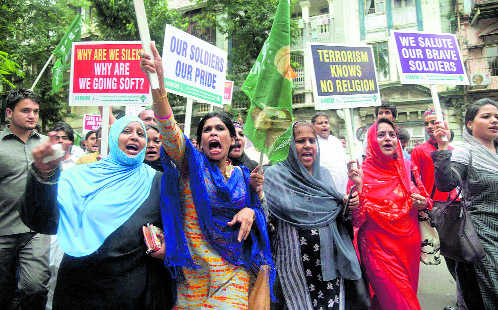
A demonstration in Mumbai. PTI
Saba Naqvi
The highpoint of my TV entertainment this week was to hear an RSS/BJP functionary who is an old friend of mine declare on prime time that Sri Aurobindo had predicted that Pakistan would cease to exist by 2018. Wonderful, I thought, problem solved! Before that another agitated panelist had held forth about the vile nature of the Pakistani army: among the sins he listed a proclivity for keeping many “mistresses”. A third panelist suggested in all seriousness that one of the panelists be sent forthwith to serve the nation in the PMO.
It was a complete scream. But jokes apart we must ask if after the Uri attack the government is contemplating military options against Pakistan. Not being a retired general or retired foreign secretary I don’t know. But I do know that both the prime ministers of India from the BJP have had dramatic engagements with Pakistan, fluctuating from war noises to peace gestures to mobilizing troops. Atal Bihari Vajpayee, whose PMO I covered for six years, genuinely wanted to leave a legacy of a peace in South Asia. That was his passion (economics frankly bored him). But as it turned out we had the Kargil war instead (provoked entirely by Pakistani excursions) and then Operation Parakram that began after the attack on Indian Parliament. It cost us a bomb literally and metaphorically and killed 798 Indian soldiers, mostly due to stepping on land mines and ammunition accidents. The Kargil war claimed less lives: 527 Indian soldiers.
Narendra Modi is a very different personality but even he has made a couple of friendly gestures towards Pakistan, most dramatically dropping in suddenly to greet Nawaz Sharif on his birthday on December 25 last year. Now after Sharif’s latest speech at the UN and the Uri attack whatever goodwill there was may have gone for the immediate future.
But are we seriously thinking of military options? I wish Jaswant Singh, a critical part of the Vajpayee establishment, had been able to give his views about mobilizing troops on the border. (Sadly, he has been in a coma for two years). The man who served as Finance, Defence and External Affairs minister under Vajpayee had elaborated to me about his opposition to Operation Parakram.
Here are his exact words as I recorded them: “I was not there when certain important decisions were taken. When I came back, I said, what have you done? No, no, it will be advantageous, I was told. Then it was fait accompli. Troops had already been deployed. I said I did not stand for war. Soldiers know what war is. A soldier can never be a war-monger. I had differences with Atalji too at that time. When he said “aar-paar ki ladai ho jaaye (let there be a fight to the finish)”, I said to him, what are you saying? Atalji said, “Us waqt kah diya (I just said it at that time).” Atalji was a man given to emotion and rhetoric. But he would never take offence at honest criticism.” The last time I met Jaswant Singh was in September 2012 when I moderated the discussion at the launch of his book titled The Audacity of Opinion: Reflections, Journeys, Musings. He did have a lot of opinions that did not sit well in the BJP post the Vajpayee era. I imagine he would have thought that if revenge is to be a trigger for action, then it is a dish best served cold.
Meanwhile, it may be worth our while to reflect on the fact that Vajpayee possibly earned a certain level of credibility in Kashmir valley as he was prime minister when one of the fairest elections in Jammu & Kashmir took place in 2002 in four phases. Electronic voting machines were used for the first time and the elections were seen as a victory of the ballot over the bullet. Mufti Mohammad Sayeed became chief minister after for three years in a seat-sharing arrangement with the Congress.
I remember covering that campaign and meeting two candidates who were later shot dead by terrorists who were opposing the elections. There was also a close shave when I got delayed returning from the beautiful Lolab valley that was then a hiding place for separatists and militants. It was dark and we had not made it to Srinagar when an army post shot at our vehicle and missed. We could only move on when our Indian identities were revealed.
This time round Mufti made a pact with the BJP. He has passed away but his party has for a complicated set of reasons not under their control, now lost all credibility. The valley should have by now been under Governor’s rule but I suspect the only reason that the PDP-BJP regime stays in power is because the BJP has stakes in government. It is a good question to ask why the people of Jammu should be denied their mandate. But what of the people in the Valley now entering the third month of their torment? Perhaps we should ask friends in the RSS if there are any prophecies about Kashmir. Pakistan, rest assured, will cease to exist.



























